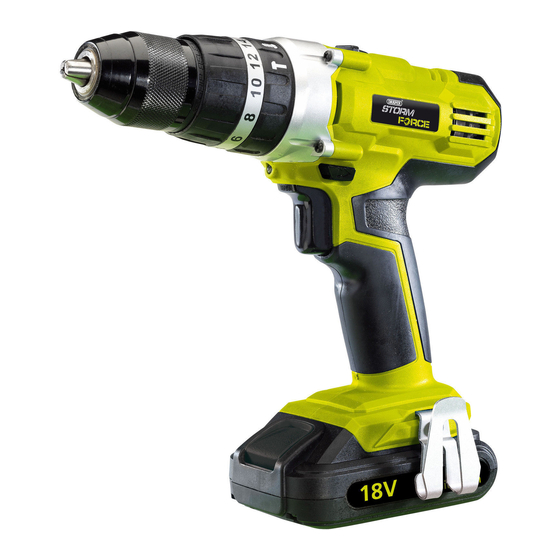Draper 82099 Руководство по эксплуатации - Страница 12
Просмотреть онлайн или скачать pdf Руководство по эксплуатации для Сверло Draper 82099. Draper 82099 20 страниц. 18v li-ion cordless hammer drill

8.
BASIC CORDLESS ROTARY DRILL OPERATIONS
8.4 INSTALLING AND REMOVING BITS - FIG. 3
Screwdriver bits are consumable items.
Before screwdriving check that there are no hidden
hazards such as electrical cables, water or gas pipes
running below the surface use a metal/voltage detector.
The drill is fitted with a keyless chuck
that a chuck key is not required to secure the drill or
screwdriver bit. Place the drill bit shoulder into the
chuck as far as it will go, then hand tighten.
Short screwdriver bits need only be inserted to the
depth of the hexagon shank before tightening chuck
by hand.
8.5 LED WORKLIGHT - FIG. 4
To aid drilling a screwdriving in confined, inadequately
lit spaces, the LED worklight
illuminates when the trigger is activated.
8.6 FORWARD/REVERSE SELECTOR - FIG. 5
The switch determines the direction of rotation of the
chuck, i.e. clockwise or anticlockwise.
(i)
Stop the drill and push switch
right.
NOTE: When the direction switch is pushed to the
left, the chuck will rotate clockwise.
When the switch is pushed to the right, the chuck
will rotate anticlockwise. Before operation, check
that the switch is set in the required position. Do
not change the direction of rotation until the chuck
comes to a complete stop.
(ii) When the drill is not in use move the direction
switch to the neutral position (the middle setting)
to lock the trigger out.
8.7 TRIGGER
When the trigger is depressed, the chuck will rotate
(provided the direction switch is set in the forward or
reverse position). This trigger switch is electronic which
enables the user to vary the speed continuously. The
speed varies according to how far the trigger switch is
depressed. The further it is depressed, the faster the
chuck will rotate. The lighter it is depressed, the slower
it will rotate.
12
, this means
automatically
to the left or
FIG.3
FIG.4
FIG.5
